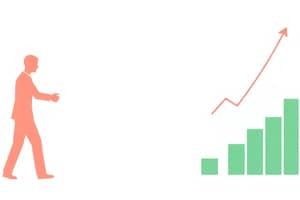Podcast
Questions and Answers
Economics primarily focuses on the study of money and wealth distribution among societies.
Economics primarily focuses on the study of money and wealth distribution among societies.
False (B)
Economic agents always make perfectly rational decisions with complete information.
Economic agents always make perfectly rational decisions with complete information.
False (B)
Positive economics focuses on subjective value judgments and opinions about the economy.
Positive economics focuses on subjective value judgments and opinions about the economy.
False (B)
Normative economics is concerned with describing what economic agents actually do, based on empirical evidence.
Normative economics is concerned with describing what economic agents actually do, based on empirical evidence.
Microeconomics studies the economy as a whole, including aggregate production and inflation.
Microeconomics studies the economy as a whole, including aggregate production and inflation.
Macroeconomics examines the behavior of individual firms and consumers in specific markets.
Macroeconomics examines the behavior of individual firms and consumers in specific markets.
Optimization in economics means agents always achieve the best possible outcome, even without complete information.
Optimization in economics means agents always achieve the best possible outcome, even without complete information.
The concept of 'feasible' options refers to the choices that are not available to an economic agent due to constraints.
The concept of 'feasible' options refers to the choices that are not available to an economic agent due to constraints.
The optimal choice remains consistent regardless of changes to available information at the time of the economic decision.
The optimal choice remains consistent regardless of changes to available information at the time of the economic decision.
Opportunity cost refers to the monetary value gained from a particular choice, rather than the value of the best alternative use of a resource.
Opportunity cost refers to the monetary value gained from a particular choice, rather than the value of the best alternative use of a resource.
In a cost-benefit analysis, benefits and costs do not need to be measured in a common unit for effective comparison.
In a cost-benefit analysis, benefits and costs do not need to be measured in a common unit for effective comparison.
An economic equilibrium is a state where all participants can benefit by changing their behavior, leading to further adjustments.
An economic equilibrium is a state where all participants can benefit by changing their behavior, leading to further adjustments.
The 'free-rider' problem occurs when an individual bears all the costs of a choice while others enjoy the benefits.
The 'free-rider' problem occurs when an individual bears all the costs of a choice while others enjoy the benefits.
Empiricism in economics involves analyzing anecdotal evidence to address specific research questions.
Empiricism in economics involves analyzing anecdotal evidence to address specific research questions.
A simplified depiction of reality, such as a model, is considered ineffective if it perfectly mirrors all aspects of the real world.
A simplified depiction of reality, such as a model, is considered ineffective if it perfectly mirrors all aspects of the real world.
A correlation between two variables definitively implies that a causal relationship exists between them.
A correlation between two variables definitively implies that a causal relationship exists between them.
In a controlled experiment, subjects are assigned to treatment and control groups based on their pre-existing characteristics to ensure accurate results.
In a controlled experiment, subjects are assigned to treatment and control groups based on their pre-existing characteristics to ensure accurate results.
Economic questions are considered 'good' if they are irrelevant to social welfare but can be answered using complex theoretical models.
Economic questions are considered 'good' if they are irrelevant to social welfare but can be answered using complex theoretical models.
Graphs can only be employed to represent real world scenarios and not to visually summarize numeric information or models.
Graphs can only be employed to represent real world scenarios and not to visually summarize numeric information or models.
Maximizing 'net benefit' in optimization means choosing the option where total costs are significantly higher than total benefits.
Maximizing 'net benefit' in optimization means choosing the option where total costs are significantly higher than total benefits.
Optimization in differences involves analyzing costs and benefits in totality, rather than focusing on changes from one option to another.
Optimization in differences involves analyzing costs and benefits in totality, rather than focusing on changes from one option to another.
In marginal analysis, a decision-maker should avoid options that lead to improvement and choose options that worsen their position.
In marginal analysis, a decision-maker should avoid options that lead to improvement and choose options that worsen their position.
Marginal cost represents the total cost incurred when making a specific economic decision, rather than the additional expense for choosing one option over another.
Marginal cost represents the total cost incurred when making a specific economic decision, rather than the additional expense for choosing one option over another.
Flashcards
Economics
Economics
The study of how agents make choices with scarce resources and the effects of these choices on society.
Economic Agents
Economic Agents
Any individual or group that makes choices, such as consumers, firms, or governments.
Scarce Resources
Scarce Resources
Goods for which there are not enough to satisfy everyone's wants.
Positive Economics
Positive Economics
Signup and view all the flashcards
Normative Economics
Normative Economics
Signup and view all the flashcards
Microeconomics
Microeconomics
Signup and view all the flashcards
Macroeconomics
Macroeconomics
Signup and view all the flashcards
Optimization
Optimization
Signup and view all the flashcards
Trade-offs
Trade-offs
Signup and view all the flashcards
Budget constraint
Budget constraint
Signup and view all the flashcards
Opportunity cost
Opportunity cost
Signup and view all the flashcards
Cost-benefit analysis
Cost-benefit analysis
Signup and view all the flashcards
Equilibrium
Equilibrium
Signup and view all the flashcards
Free-rider problem
Free-rider problem
Signup and view all the flashcards
Empiricism
Empiricism
Signup and view all the flashcards
Model
Model
Signup and view all the flashcards
Causation
Causation
Signup and view all the flashcards
Correlation
Correlation
Signup and view all the flashcards
Omitted variables
Omitted variables
Signup and view all the flashcards
Reverse casualty
Reverse casualty
Signup and view all the flashcards
Controlled experiments
Controlled experiments
Signup and view all the flashcards
Natural experiments
Natural experiments
Signup and view all the flashcards
Optimization in levels
Optimization in levels
Signup and view all the flashcards
Study Notes
- Economics is the study of agents making choices with scarce resources and the societal effects of these choices.
Economic Agents and Scarce Resources
- Economic agents include individuals, households, firms, and governments, all of whom make choices, usually aiming for optimal outcomes.
- Scarce resources are those insufficient to satisfy everyone’s wants.
Positive Economics
- Positive economics describes what economic agents actually do, focusing on objective analysis and facts about the economy.
- It explains and predicts economic phenomena without value judgments.
- Examples include determining mean wages across sectors or analyzing the gender income gap.
Normative Economics
- Normative economics involves decision-makers determining what economic agents should do, addressing subjective questions and resulting in public policies.
- Examples include deciding the best job offer for a worker or whether to introduce policies to reduce the gender income gap.
Microeconomics
- Microeconomics studies how individuals, households, firms, and governments make choices and the effects on prices, resource allocation, and the well-being of others.
- It focuses on isolated parts of the economy.
- Examples include consumer choice, electricity market design, and firm behavior.
Macroeconomics
- Macroeconomics studies the economy as a whole, including aggregate production, inflation, economic cycles, labor market performance, and monetary policy.
- Examples include the effect of labor reform on unemployment and GDP or the adequacy of public programs to stimulate the economy.
First Principle: Optimization
- Optimization involves making the best choice possible with the given information.
- Feasible options are those available to an agent.
- The "best" choice depends on the agent’s preferences.
- Trade-offs occur when choosing one thing means giving up something else.
- Budget constraints limit choices due to limited resources.
- Opportunity cost is the value of the next best alternative use of a resource, often expressed in monetary terms.
- Cost-benefit analysis compares benefits and costs in a common unit to determine the best choice.
Second Principle: Equilibrium
- Equilibrium is a situation where no one benefits from changing their behavior.
- Decisions are optimally made given available information.
- The free-rider problem arises when someone enjoys benefits without bearing all the costs.
- An example includes a flatmate who watches TV instead of cleaning dishes.
Third Principle: Empiricism
- Empiricism is using data to answer interesting questions.
- Correlation differs from causation.
- Observing crowded beaches when temperatures are high does not mean cooling the beaches will deter crowds.
Scientific Method
- Specify a simplified model of reality.
- Formulate hypotheses (predictions).
- Test the model using data.
- Revise the model if it does not accurately explain data.
- A flat map of the Madrid metro is useful, but a flat-earth model is not useful for flying to New York.
Causation vs. Correlation
- Causation occurs when one thing directly affects another.
- Correlation measures how two things change in relation to each other and can be positive or negative.
- Omitted variables occur when a correlation doesn't make sense until a missing variable is added to analysis.
- Reverse causality is when the cause and effect are opposite of what is assumed.
- Controlled experiments randomly put subjects into treatment and control groups.
- Natural experiments occur when subjects end up in treatment or control groups due to events not controlled by the researcher.
Good Economic Questions
- Good economic questions are relevant, important, and can be answered empirically, and contribute to social welfare.
Graphics
- Graphics can visually summarize numeric information and represent models.
- The equation of a line is y = mx + n, where m is the slope and n is the y-intercept.
Optimization
- Optimization in levels involves calculating total benefit minus total cost (net benefit).
- Optimization in differences involves analyzing the change in net benefit between options.
Limits to Optimization
- Limits include incomplete information, the cost of collecting information, and inexperience.
- Trade-offs are unavoidable.
Cost of Commuting
- Factors include public transportation, gasoline, parking, wear and tear on a car, and the opportunity cost of time.
Marginal Analysis
- Express all costs and benefits in the same unit.
- Calculate the changes in costs and benefits when moving from one option to another.
- Choose the option that improves your situation by moving toward it.
- Marginal cost is the additional cost of choosing one decision over another.
Studying That Suits You
Use AI to generate personalized quizzes and flashcards to suit your learning preferences.




